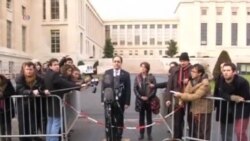LONDON —
Syrian government and opposition negotiators met in Geneva this week for a first round of talks, but they were fraught with difficulties, not only on substance but on what to talk about and even how to talk about it.
The delegations from the government and opposition issue sharp criticisms of each other as they arrive for each meeting at the United Nations' Geneva headquarters. And that is the only time they are seen. They have not allowed any photos to be taken as they sit across from each other inside the conference room.
The mediator, veteran Algerian diplomat Lakhdar Brahimi, is the man in the middle.
“One delegation is on the right and the other on the left and they face one another and they talk to one another," he said. "No, they talk through me to one another.”
And that is the closest they come to negotiating. About half the time, they are in different rooms, meeting separately with the mediator, a situation that generates media reports of problems and breakdowns in the talks.
But it is often more productive to meet with hostile parties separately, according to former U.S. diplomat Daniel Serwer of the Middle East Institute, who helped negotiate the end of the Bosnian War 20 years ago.
“It’s only when they’re in separate rooms that you can hope to get a little bit more from them -- why they want something, whether they can give something," he said. "All of that is done out of the hearing of the other.”
And there is another aspect of these talks, which was on display during the preliminary meeting the previous week. The main backers of the Syrian government and opposition - Russia and the United States - officially called on the U.N. to host these talks. A week later, Syrian Deputy Foreign Minister Faisal Makdad indicated their delegations are never far away.
“The two initiators are also in different rooms sitting beside. I think our Russian friends are playing a positive role," he said. "I don't know what Robert Ford is doing on the other side, but you see he failed to bring even a credible delegation to the discussion.”
Robert Ford is the U.S. ambassador to Syria, and he heads the American delegation at the Geneva talks. His boss, U.S. Secretary of State John Kerry, made clear last week that the tense negotiating room in Geneva is not the only venue for Syria peace efforts.
“What you see in the direct talks between the opposition and the Assad regime will not be the full measure of effort being expended in order to try to find a solution here,” he said.
And that could be particularly important because these talks, whether together or separately, are moving at best in what the mediator calls “half steps.”
The delegations from the government and opposition issue sharp criticisms of each other as they arrive for each meeting at the United Nations' Geneva headquarters. And that is the only time they are seen. They have not allowed any photos to be taken as they sit across from each other inside the conference room.
The mediator, veteran Algerian diplomat Lakhdar Brahimi, is the man in the middle.
“One delegation is on the right and the other on the left and they face one another and they talk to one another," he said. "No, they talk through me to one another.”
And that is the closest they come to negotiating. About half the time, they are in different rooms, meeting separately with the mediator, a situation that generates media reports of problems and breakdowns in the talks.
But it is often more productive to meet with hostile parties separately, according to former U.S. diplomat Daniel Serwer of the Middle East Institute, who helped negotiate the end of the Bosnian War 20 years ago.
“It’s only when they’re in separate rooms that you can hope to get a little bit more from them -- why they want something, whether they can give something," he said. "All of that is done out of the hearing of the other.”
And there is another aspect of these talks, which was on display during the preliminary meeting the previous week. The main backers of the Syrian government and opposition - Russia and the United States - officially called on the U.N. to host these talks. A week later, Syrian Deputy Foreign Minister Faisal Makdad indicated their delegations are never far away.
“The two initiators are also in different rooms sitting beside. I think our Russian friends are playing a positive role," he said. "I don't know what Robert Ford is doing on the other side, but you see he failed to bring even a credible delegation to the discussion.”
Robert Ford is the U.S. ambassador to Syria, and he heads the American delegation at the Geneva talks. His boss, U.S. Secretary of State John Kerry, made clear last week that the tense negotiating room in Geneva is not the only venue for Syria peace efforts.
“What you see in the direct talks between the opposition and the Assad regime will not be the full measure of effort being expended in order to try to find a solution here,” he said.
And that could be particularly important because these talks, whether together or separately, are moving at best in what the mediator calls “half steps.”





